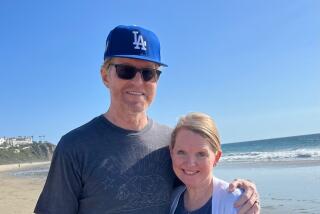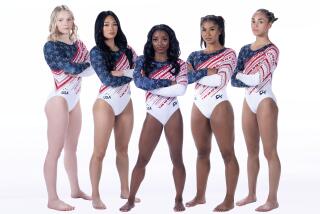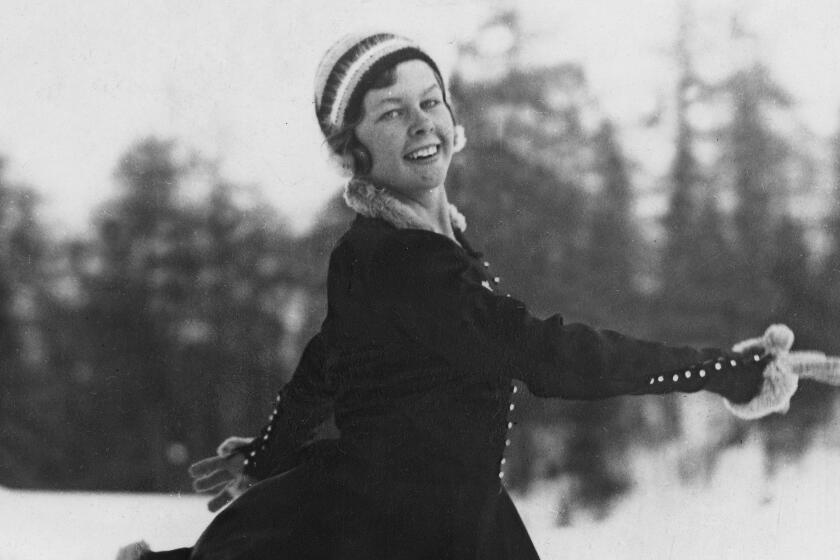Culling Interest Would Be Next Miracle on Ice
The United States is facing Russia in a hockey game, and the buildup is about as loud as a snowflake landing.
You could say that’s a statement about international relations. Sadly, it’s also a reflection on the state of American hockey.
There’s no Cold War political backdrop, and Team USA is practically assured of advancing to the medal round, even if it loses (unless Latvia uncorks a 14-goal game against Kazakhstan). Not much stress for the Americans.
But try suggesting the term “meaningless game” to the Canadians, who are suffocating in their sweaters from the pressure back home to win, even though they too will skate into the next round.
In the U.S., there’s more talk about the quick slip of Lindsey Jacobellis than the slow slide of the hockey team. Team USA began with a tie against Latvia, beat Kazakhstan and lost its last two games to Slovakia and Sweden, each 2-1. Not too many letters to the editor or radio show rants about it.
To a man, the players and coaches say they’re close, that they’re doing a lot of good things but it just isn’t translating into victories -- or buzz.
“Obviously, we haven’t had the success we’ve wanted in the win column, but we have had the effort,” defenseman Bret Hedican said. “If we continue that effort, coming into this next round, and get some goals going our way, we could surprise some people ... and people could start talking about the United States of America hockey team.”
Perhaps they might even talk about it in the United States of America.
The problem is, hockey is caught in a perilous loop. Every time the NHL shoots itself in the foot, it sets back the U.S. Olympic team. And when the Olympic team gets checked into the boards, it sets back the NHL.
The “Miracle on Ice” effect has passed. The generation that was inspired to grab a stick and head for the ice after the 1980 team’s gold medal now makes up the older demographic of the NHL. Today’s kids need their own inspirational moment.
But until that happens, what’s supposed to draw kids to hockey and feed the national program when the NHL keeps sliding off the sports landscape?
The Americans had a strong showing in Salt Lake City, finishing second to Canada in an outstanding field that produced some great hockey. Then Gary Bettman and Co. threw it all away with the lockout that wiped out the 2004-05 season, and professional hockey was back behind its own net.
Some members of the 2002 team -- Brett Hull, Brian Leetch, Jeremy Roenick -- have retired or moved past their prime. The next generation of players isn’t quite ready to step in. Thus the lowered expectations.
“We were picked to be sixth or seventh in the tournament, so there’s not much respect,” said Mike Modano, who was the best player in the 2002 Olympics for some stretches. “But you need to be successful to get respect.
“That’s where we kind of lack. Salt Lake was a good coming-out for us. It was a good showing for us. But we need to back that up. We need to be consistent. That’s what makes the Finns and the Swedes and Canada so good. We need to repeat it. The American hockey has grown. It’s gotten better. We just need to try to be patient with it.”
In the meantime, is there enough patience to wait for Canadian Sidney Crosby or someone else to become the next Wayne Gretzky? That’s the other thing the NHL is missing, a transcendent North American superstar whose face represents the sport.
There are encouraging signs for the game’s future. The number of players registered with USA Hockey has doubled since 1992 and is now around half a million. But it’s still such a regional sport and, nationally, hockey doesn’t rank among the top 10 for participation among high school sports.
Chris Chelios, the aging warrior who has seen it all, sees the cavalry coming just over the hill.
“They talk about passing the torch, but it just wasn’t time yet,” Chelios said.
If they were ready now, perhaps his services wouldn’t be needed here in Turin.
He points to the United States’ victory over Canada to win the junior world championships in 2004. That squad was led by forward Zach Parise, the tournament’s most valuable player, goalie Al Montoya and defenseman Ryan Suter, whose father, Bob, was a member of the 1980 Olympic team.
“I think it’s a good transition,” Chelios said. “Come next Olympics, I think you’re going to see a whole new wave of American players and guys that are going to be good, that won that junior championship. It says a lot for the U.S. programs.”
But if this current team flops, that means eight years, at the earliest, will pass between U.S. Olympic successes. Should the 2010 group fail, it will be 12 years, a mini-generation.
How quickly does time pass? Well, three players on this year’s USA squad were born after the Miracle on Ice, and four were not even 2 when it happened. Tick, tock, tick, tock ...
As a Philadelphia Flyer, goalie Robert Esche is aware of the reverence still shown to their championship teams of 1974 and 1975, even though he wasn’t born until 1978. But there’s only so long you can ask the Internet generation to draw inspiration from history books.
“I know how well-respected those people are, and in the United States we know how well respected the 1980 team is,” said Esche, who will get the start tonight. “You can’t say we’re like them, we know that, but a strong showing, a gold medal, would be great for our country altogether. And not because of the sport, because of the fact that we’re representing our country.”
The patriotism is great, but I wish there were a little more pride in the big picture, the future of the sport. Players and ownership forgot it when they canceled a season to get the economic house in order, forgetting that the first order of modern sports economics is to have television viewership.
“We’re just worried about winning games,” Bill Guerin said. “Then the further we go, the better off the promotion will be. But we don’t think of that aspect. We just think about winning a gold medal.”
The players want that medal. The sport needs it.
J.A. Adande can be reached at j.a.adande@latimes.com. To read previous columns by Adande, go to latimes.com/adande, and to read more, go to latimes.com/adandeblog.
More to Read
Go beyond the scoreboard
Get the latest on L.A.'s teams in the daily Sports Report newsletter.
You may occasionally receive promotional content from the Los Angeles Times.





